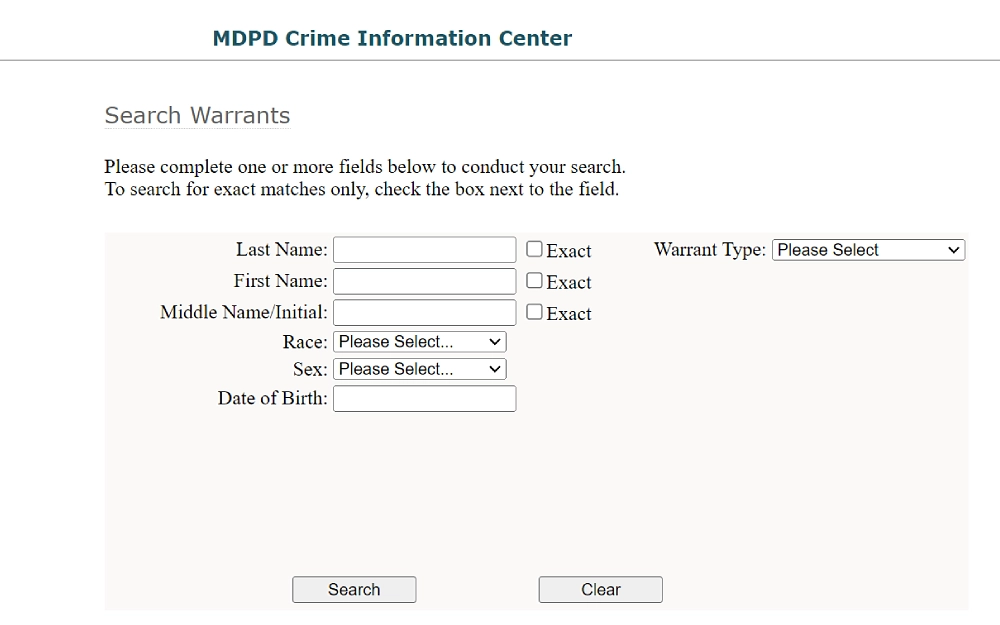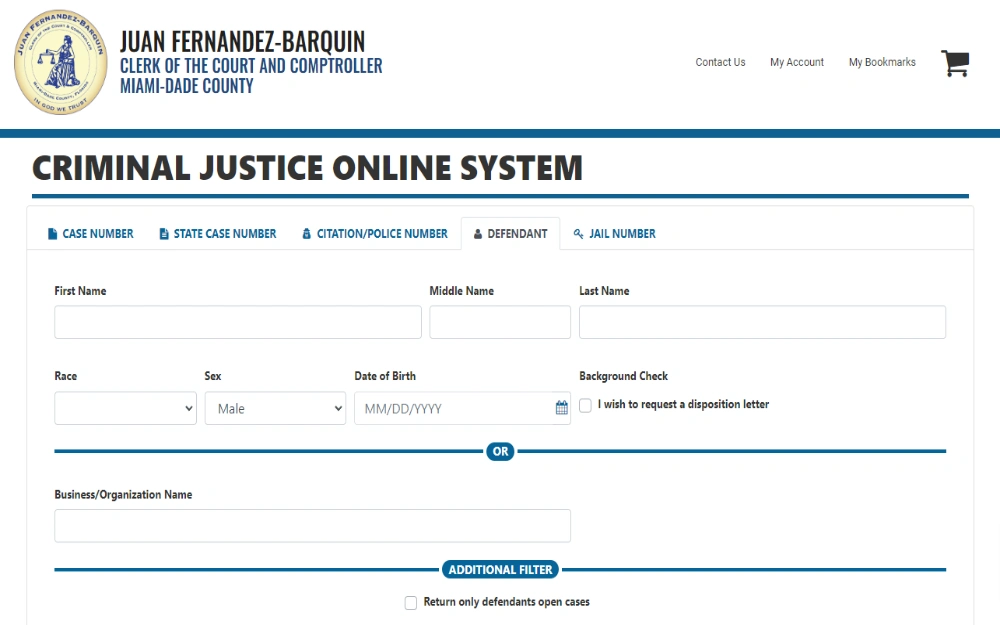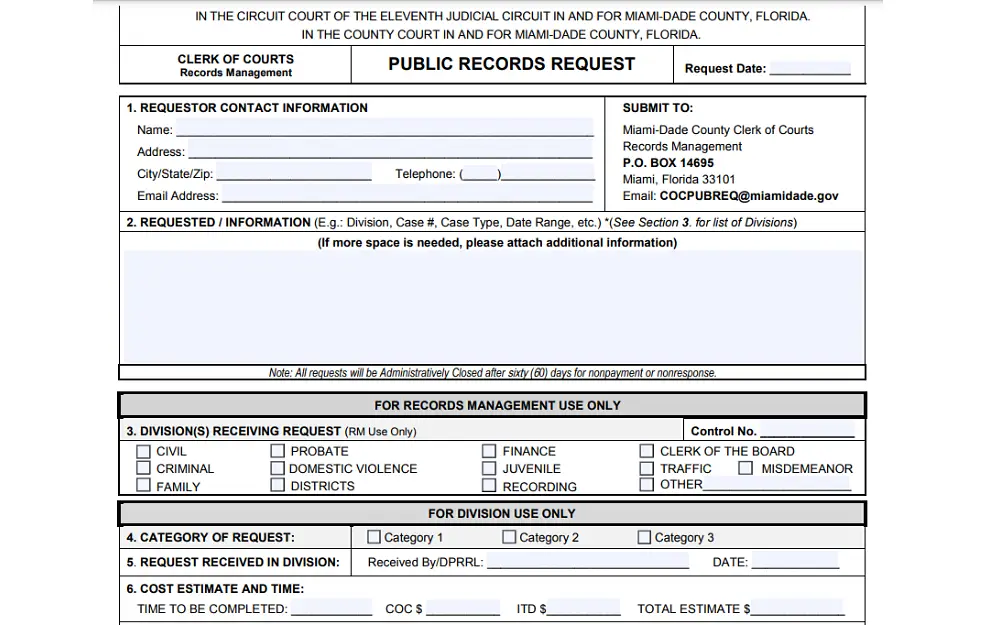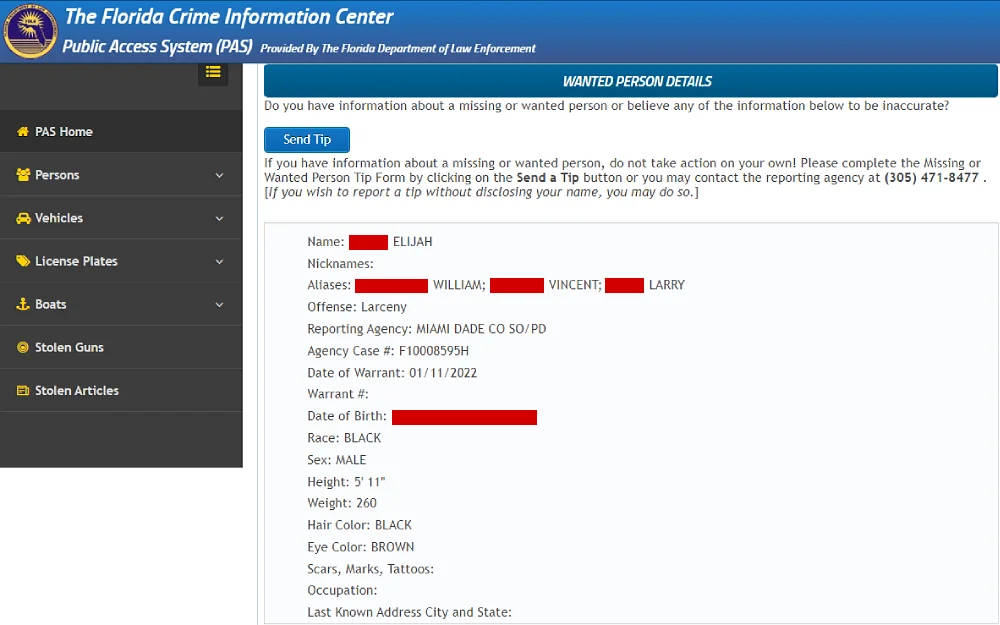Perform a free Miami-Dade County warrant search in just minutes to determine if you or someone else is wanted.
Warrants are legal orders that grant courts and law enforcement agencies the authority to make arrests and searches. Certain record custodians may make warrant information readily accessible to citizens through online databases at no cost.
This resource gives clear steps on how to seamlessly conduct a warrant search in Miami-Dade County, Florida.
An Overview of Looking Up Warrants in Miami-Dade County Florida
Before you begin your search for Miami-Dade County warrants it is important to know the Florida state policy on public records. Warrants are documents maintained in the normal course of government agency business and are subject to public records laws.
Florida Statute 119.01 provides that it is the general policy of the state to keep public records open for inspection and copying by anyone.1 Section 119.07 lays out the rules for public records inspections and copying. The law requires records custodians of public records to promptly acknowledge requests for inspection and copying and make reasonable efforts to comply.
Government agencies are required to make public records readily available to the public unless a specific exemption applies. If a government agency believes that a record is exempt from public disclosure, it is required to inform the requester of the basis for the exemption.
The agency must also state in writing the particular reasons for concluding that the record is exempt or confidential. Moreover, if an exemption applies to a public record, the government agency must redact the portion to which the exemption applies and produce the remainder of the record for inspection and copying.
Florida Statute 119.071 provides the statutory exemptions to public records disclosure.2 Most pertinent to warrants is the exemption pertaining to criminal investigation information.
There are several different types of warrants which will be covered in more detail in subsequent sections. However, generally, warrants are generated by courts and law enforcement agencies to make arrests of people who have violated criminal laws or court orders and to search for evidence linked to crimes.
Search warrants will always be exempt from disclosure because they are only created for the purpose of furthering a criminal investigation. To disclose the information in a search warrant, especially before it is executed, would undermine a criminal investigation and not be in the best interests of the state.
Arrest warrants, on the other hand, may become public before or after they are executed. Information from an arrest warrant may be made public before execution in the event that disclosure would assist a law enforcement agency in apprehending a fugitive who is evading capture. An arrest warrant may also be made public by a court to inform individuals who have missed a scheduled court appearance that they are now in contempt of court and may be arrested.
After an arrest warrant is executed it becomes a criminal case filed in a court of law. In Florida, a criminal case is filed in circuit, county, or municipal court depending on the severity of the crime alleged.
Information from criminal cases is almost always available for inspection and copying. Courts may also elect to provide case information online at no cost.
To perform a warrant search in Miami-Dade County, you should know the name of the individual you are searching for and their address or date of birth. This will help you narrow your search, as many people have the same or similar names.
The custodians of warrants and information contained in warrants are on the state, county, and municipal level. Each level contains its benefits, and when you search thoroughly, you should be able to locate the information you need.
Find out how you can perform a warrant search in Miami-Dade County by following the information below.
How To Execute a Miami-Dade County Warrant Search
When performing a warrant search in Miami-Dade, it is best to start your search through county agencies. Counties encompass the cities and towns in the area, and the agencies provide resources that are broader in scope than municipalities.
Miami-Dade County does not have a sheriff’s office. However, the Miami-Dade Police Department stands in as the preeminent law enforcement agency for the county.3 The police department provides the public with a free online warrant search tool.4

Interested parties can look up several types of warrants, including bench warrants. The Miami-Dade Police Department does not contend that the information in the database is current. You should contact the police department that issued the warrant for verification.
The warrant search tool is name-based, and results can be narrowed by including the race, sex, and date of birth. Miami-Dade County is large, and results are limited to only 1000.
If results exceed 1000, you will receive an error. So, you should ensure that the search is tailored specifically to the person you are searching for.
The Miami-Dade Police Department also provides a most wanted sexual offenders list.5

Individuals on this list have been charged with committing crimes of a sexual nature and have active warrants out for their arrest. In addition, the police department works closely with Crime Stoppers of Miami-Dade to identify individuals wanted by law enforcement agencies in the area.
For more information, contact the Miami-Dade Police Department’s Warrants Bureau.
Miami-Dade Police Department
Warrants Bureau
9105 N.W. 25th Street
Doral, Florida 33172
Phone: 305.471.1700
Fax: 305.471.1736
Email: [email protected]
In Florida, criminal cases are sent to circuit or county courts. Felony criminal cases are heard in circuit courts while misdemeanors are heard in the county courts. Its common for both the circuit and county courts to be housed in the same courthouse facility.
The Eleventh Judicial Circuit of Florida is responsible for the Miami-Dade circuit and county court system. All criminal cases filed in circuit and county courts are maintained by the Miami-Dade Clerk of the Court & Comptroller.
Through the Criminal Justice Online System, the clerk’s office provides the public with a free tool to search criminal cases in Miami-Dade County.6 The tool allows anyone to search by defendant name or case, state, citation, or jail number.

If you search by the defendant’s name, ensure that you enter both the first and last name. You must also include the sex of the defendant. Provide as much information as possible so that your results are narrowed to the person you are searching for.
Results will be displayed in a list of defendants organized by date of birth, with the oldest person listed first. When results are generated you will be able to view additional information that displays the charges.
If you wish to view a court case file, you may submit a public records request.7.

After you submit a public records request form the clerk’s office will inform you of the cost to produce the records. Requests may be submitted by mail or email to the following address:
Miami-Dade County Clerk of Courts
PO Box 14695
Miami, Florida 33101
Email: [email protected]
You may also visit the clerk of the court’s office in person. Most clerks of court allow members of the public to also submit records requests in person. Contact the clerk of court for more information.
Miami-Dade County Clerk of the Court & Comptroller
73 West Flagler St.
Miami, FL 33130
Phone: 305.275.1155
How To Determine if Someone Has a Warrant Anywhere in Florida (Statewide Lookup)
There are also ways to determine if someone has a warrant somewhere else in Florida. When a county or city-level search proves to be inadequate, a statewide warrant search will be your best bet.
Most states have statewide law enforcement agencies and judicial branches that provide resources to the public. This is also true for Florida. The Florida Department of Law Enforcement is the statewide police agency with the most resources to locate warrants.
Police departments in the state provide reports and statistics to the Florida Department of Law Enforcement. This enables the agency to compile information into databases for public consumption.
One way this is effective is through the Wanted Persons Search.8 Through this platform, anyone can conduct a statewide warrant search.

The Wanted Persons Search provides a free method for anyone to look up warrants issued by a police department located in Florida. The Wanted Person’s Search is not perfect and information may not be up to date at the time of your search. However, it is a useful tool that can help you when a county or city-level search is unsuccessful.
It is a name-based search, where users may enter the last name of an individual for the search to yield results. It is best to also include additional information, like a first name or sex, so that results are narrowed.
After the results are generated, you can click on the row of a defendant to see what offense led to the warrant. For more information about statewide warrants, contact the Florida Department of Law Enforcement.
Florida Department of Law Enforcement
2331 Phillips Rd.
Tallahassee, Florida 32308
Phone: 850.410.7000
A statewide court system is also available to help interested parties locate criminal case information online. The Florida Judiciary offers such a service through its online court records search at no cost.9 Members of the public have the opportunity to research all criminal cases filed in county courts.
You do not have to create an account to use the search. Users can perform an anonymous search by selecting ‘Public’ as the access option. After agreeing to the disclaimer you may perform a criminal case search by a defendant’s name or case number.
Florida Courts
500 S. Duval St.
Tallahassee, Florida 32399
Phone: 850.922.5081
An Overview of Warrant Types
Warrants may have many different names but they can be distilled down to two distinct functions – to arrest or to search. Warrants are legal documents created by courts and law enforcement agencies to comply with the 4th Amendment search and seizure provisions. They enable government agencies to arrest a person or search for a specific thing.
Any of these can be referred to as an ‘active warrant’, which means it has not been executed. Find out what the different types of warrants are in Miami-Dade County, Florida.
Arrest Warrants: Issued and executed by law enforcement upon probable cause that an individual has violated the Florida criminal statute.
Bench Warrants: Issued by a judge in a court of law when a defendant does not show up for their court appearance without legal excuse.
Probation & Parole Violation Warrants: Upon the recommendation of a probation and parole board, these warrants are a type of arrest warrant issued when an individual released from confinement violates the conditions of that release.
Traffic Warrants: Citations written by law enforcement officers when they observe a driver violate the traffic laws of Florida.
Child Support Warrants: Issued by a family court when a parent fails to provide court ordered child support payments without just cause.
Capias & Capias Pro Fine Warrants: A type of bench warrant in Florida issued when a person fails to appear in court.
Fugitive Warrants: Issued by law enforcement for the most dangerous felons who have escaped prison or are actively evading arrest.
Search Warrants: Executed by law enforcement to search a person, place, or thing for specific evidence linked to an alleged crime.
How To Resolve a Warrant in Miami-Dade County
When faced with a warrant there are some options you can take to address it. If it is someone you know who has an outstanding warrant, consider informing them. They may not know that a warrant is out for their arrest and there may still be time for them to resolve the issue without being arrested.
This is generally an option if the issuing agency is a court. If it is a law enforcement agency that issued the warrant, they will likely be arrested and you should inform them to consider legal counsel. You may also contact the Miami-Dade County and Florida tip lines.10, 11
If you find out that you have an outstanding warrant for your arrest, you should think about turning yourself in. You do not want to be a fugitive as you may obtain additional charges or stiffer penalties. Contact the issuing agency to determine your options. You may communicate with your family and a bail bondsman preemptively before turning yourself in.
Some courts may allow you to pay a fine and set a new court date to avoid an arrest. You should also consider obtaining legal counsel. An attorney may help you avoid jail time while your case is pending resolution.
You can use the information in this article to perform a Miami-Dade County warrant search. A warrant is a serious matter, and you should know if you or someone else has a warrant out for arrest.
References
1The Florida Senate. (2023). Chapter 119: Public Records – Public Officers, Employees and Records. Retrieved January 23, 2024, from <https://m.flsenate.gov/statutes/119.01>
2The Florida Legislature. (2023). Chapter 119: Public Records – Public Officers, Employees and Records. Retrieved January 23, 2024, from <http://www.leg.state.fl.us/statutes/index.cfm?App_mode=Display_Statute&Search_String=&URL=0100-0199/0119/Sections/0119.071.html>
3Miami-Dade Police Department. (n.d). Warrants Bureau. Retrieved January 23, 2024, from <https://www.miamidade.gov/global/police/about-warrants-bureau.page>
4Miami-Dade Police Department. (n.d). MDPD Crime Information Center. Retrieved January 23, 2024, from <http://warrants.mdpd.com/SearchWarrants.aspx>
5Miami-Dade Police Department. (n.d). Miami-Dade’s Most Wanted Sexual Predators and Offenders. Retrieved January 23, 2024, from <https://www.miamidade.gov/global/police/most-wanted-predators.page>
6Miami-Dade County Clerk of the Court and Comptroller. (n.d). Criminal Justice Online System. Retrieved January 23, 2024, from <https://www2.miamidadeclerk.gov/cjis/casesearch.aspx?AspxAutoDetectCookieSupport=1>
7Miami-Dade County Clerk of the Court and Comptroller. (2023, April). Public Records Request. Retrieved January 23, 2024, from <https://www.miamidadeclerk.gov/library/466-Web.pdf>
8The Florida Crime Information Center, Department of Law Enforcement. (n.d). Public Access System – Wanted Persons Search. Retrieved January 23, 2024, from <http://pas.fdle.state.fl.us/pas/restricted/PAS/person/WantedPersons.jsf>
9Florida Courts. (2023, October 10). Florida Courts. Retrieved January 23, 2024, from <https://www.flcourts.gov/Florida-Courts>
10Miami-Dade Police Department. (n.d). Report Suspicious Activity. Retrieved January 23, 2024, from <https://www.miamidade.gov/global/service.page?Mduid_service=ser1643307343834920>
11My Florida Legal, Office of the Attorney General State. (n.d). Tips. Retrieved January 23, 2024, from <https://www.myfloridalegal.com/home-page/tips>
